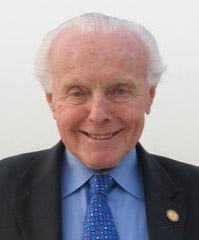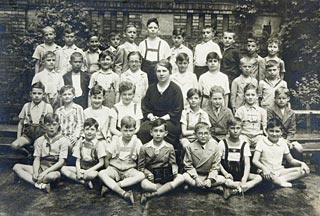UC Berkeley Press Release
 |
In a photo from the Lantos archive, the congressman (center) greets legendary House Speaker Thomas P. "Tip" O'Neill, D-Mass. (Photos courtesy the Bancroft Library) |
Tom Lantos archive donated to the Bancroft Library
BERKELEY – The papers of the late Tom Lantos of California, a leading champion of human rights and the only Holocaust survivor to serve in the U.S. Congress, are now part of the University of California, Berkeley's Bancroft Library.
 Tom Lantos |
On June 19 Lantos received the Presidential Medal of Freedom Award, the nation's highest civilian honor. In announcing the award, President Bush commended Lantos for "a lifetime of leadership, for his commitment to liberty, and for his devoted service to his adopted nation."
"Throughout my adult life, I have sought to be a voice for human rights, civil liberties and social justice, both at home and around the world,"
Lantos said in January when announcing that due to illness, he would not seek re-election.
Bancroft Library Director Charles Faulhaber said discussions with Lantos about the library acquiring his archive started around that time. Faulhaber noted that the Lantos family also gave its support to the transfer after Lantos died of cancer on Feb. 11 at the age of 80. Materials from the former Democratic congressman's offices in Washington, D.C., and San Mateo, Calif., recently began to arrive at the library, where final shipments are expected in fall 2008.
The archive includes reports and briefing notebooks, Congressional Human Rights Caucus files for countries ranging from Afghanistan to Zimbabwe, correspondence regarding legislation, campaign scrapbooks and memorabilia such as bumper stickers and political buttons, CDs, videotapes and photographs. Video of a Lantos memorial service held in the nation's capital also is in the archive, as well as original letters written in Hungarian by Lantos when he was a graduate student at the University of Washington.
 Tom Lantos in a class photo from his elementary school in Hungary. (Lantos is in the second row, to the left of the teacher.) |
He spent 30 years working as an economics professor, business consultant and international affairs analyst and served as a senior advisor to several U.S.
senators before making a successful bid for a seat in the U.S. House of Representatives in 1980. He was elected to 14 terms in Congress.
Bob King, Lantos's former chief of staff, said that as a Holocaust survivor and a self-described "American by choice," Lantos brought unique insights and perspectives to U.S. foreign policy.
Lantos grew up in an era "where the good guys and the bad guys were not Republicans or Democrats but Fascists and Communists" and he had a profound reverence for democracy and American governmental institutions, King said.
"At 80 years old, he was still a kid when it came to the excitement of being a member of Congress in Washington," he added.
Lantos was elected chair of the House Committee on Foreign Affairs in January 2007 and was a senior member of the House Committee on Oversight and Government Reform. He was the founding co-chair of the 24-year-old Congressional Human Rights Caucus.
"He was the premiere spokesman for human rights causes in Congress and was a spectacular orator," said Kathleen Moazed, director of federal governmental relations for UC Berkeley. A Capitol Hill veteran, Moazed met Lantos when he arrived in Washington, D.C., in 1980 and she was working for Rep. Sam Gejdenson (D-Conn.).
She recalled his "shock of white hair, regal bearing and lovely, very refined accent," as well as his impressive ability to speak persuasively and often extemporaneously about sometimes unpopular issues. "Being a Holocaust survivor gave him that moral authority to stand up and speak," Moazed said.
While many congressional offices are frenetic, Moazed said, Lantos's office was known as the "salon." It lacked a desk and was adorned with Persian carpets, low lights, books, paintings and his grandchildren's artwork.
Conversations there, such as one between Lantos and UC Berkeley Chancellor Robert Birgeneau last November, were often deep and philosophical, said Moazed.
While Lantos was an early supporter of the U.S. war in Iraq, he grew increasingly critical of how the war was being waged and became one of its sharpest critics. As chair of the House Committee on Foreign Affairs, he held 20 oversight hearings on the war.
Lantos supported reforming the nation's health care system and reducing the federal budget deficit and national debt. He opposed privatizing Social Security, was adamantly pro-choice, supported same-sex marriage, advocated patients' access to marijuana for medical use and strongly supported gun control.
In April 2006 Lantos and four other Democratic members of Congress assembled in front of the Sudanese embassy in Washington, D.C., to protest the Sudanese government's role in the genocide in Darfur. He and his fellow protesters were arrested for refusing to leave the property.
As Lantos was handcuffed and arrested, King recalled observing "a resolve and a firmness in his demeanor. He felt very strongly about this."
Lantos was one of the five Hungarian Jews whose story is told in "The Last Days," the Academy Award-winning documentary about the impact of the Holocaust in Hungary. He also appeared in "A Moral Debt," a documentary about Filipino American veterans of World War II.
The Tom Lantos Foundation for Human Rights and Justice was established recently to carry on his legacy.
In addition to his papers, The Bancroft Library also houses the archives of the late U.S. Rep. Robert T. Matsui (D-Calif.), who was interned with his family during World War II at the Tule Lake War Relocation Center in Northern California. The Matsui archives include documentation of Japanese-American reparations, the North American Free Trade Agreement, U.S.
military base closures and welfare reform.
Other high-ranking, now-deceased California officials whose papers are housed at the library include California Gov. Edmund G. (Pat) Brown, Sen.
William F. Knowland (R-Calif.), Sen. Thomas H. Kuchel (R-Calif.), Sen. Alan Cranston (D-Calif.) and Hiram Johnson, a former California governor and senator.
The library also has the second official archival set of records maintained by the War Relocation Authority that coordinated World War II relocation of people of Japanese heritage away from the Pacific Coast.

